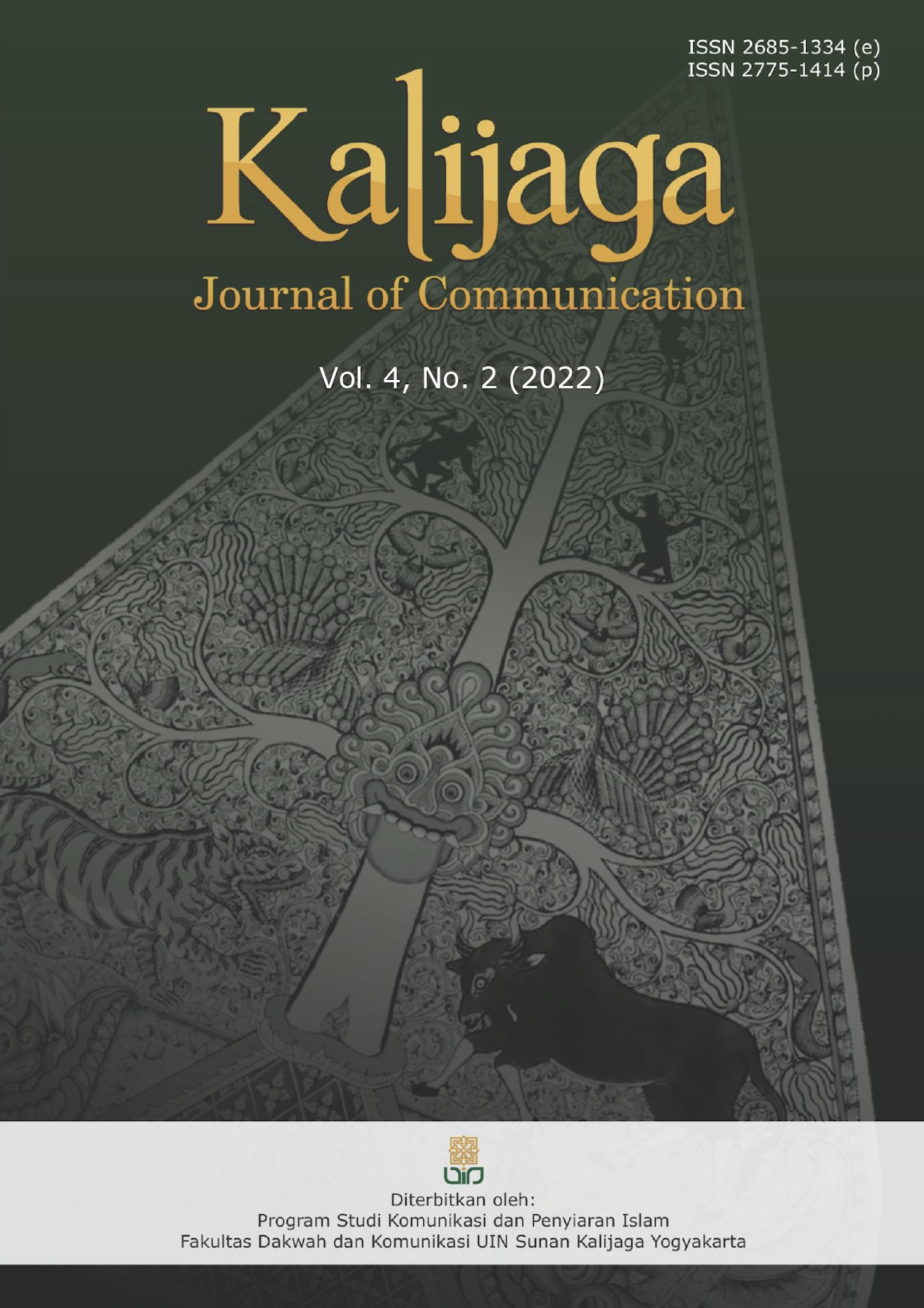Fantasi dan Ilusi: Interaksi Parasosial Fandom ARMY BTS di Media Sosial
DOI:
https://doi.org/10.14421/kjc.42.04.2022Keywords:
Popular culture, parasocial interaction, BTS fandomAbstract
This study examines ARMY BTS' parasocial interactions on social media as a result of being exposed to popular culture. Parasocial interaction refers to the relationship that develops between audiences and idolized figures through the media. This study uses a qualitative-descriptive method with the approach of Horton and Wohl's parasocial theory in a constructivist paradigm. By using in-depth interviews with three BTS ARMY informants, this study found that the presence of new media provides a more different character of parasocial interaction than the old media because fans can establish relationships with BTS as if they were conducting interpersonal communication without having to get attention. ARMY's parasocial interactions are already at the level of intense personal feeling, assuming that there is an emotional closeness between him and the character he idolizes. Apart from that, this behavior also makes ARMY always want to know the latest BTS information, establish social relations with fellow ARMYs, are willing to buy albums, merchandise or anything related to BTS, to do imitations such as following the fashion of BTS members.
References
Astagini, Nuria dkk (2017). Interaksi dan Hubungan Parasosial Dalam Akun Media Sosial Selebriti Indonesia. Jurnal UNJ, 1.
Amellita, N. (2010). Kebudayaan Populer Korea: Hallyu dan Perkembangannya di Indonesia. Universitas Indonesia Library, 23.
Azasya, S. (2020, Juni 28). https://www.idntimes.com/hype/entertainment/stella/infografis-benar-gak-sih-sinetron-kalah-pamor-dari-drama-korea/10. Dipetik Desember 21, 2020, dari https://www.idntimes.com/hype/entertainment/stella/infografis-benar-gak-sih-sinetron-kalah-pamor-dari-drama-korea/10
Burhan, F. A. (2020, September 15). https://katadata.co.id/desysetyowati/digital/5f60a926269c1/penonton-drama-korea-di-youtube-melonjak-saat-pandemi-corona. Dipetik Desember 21, 2020, dari katadata.co.id: https://katadata.co.id/desysetyowati/digital/5f60a926269c1/penonton-drama-korea-di-youtube-melonjak-saat-pandemi-corona
C.Goldhoorn, T. H. (2011). Horton and Wohl Revisited: Exploring Viewers Experience of Parasocial Interaction. Journal of Communication, 178.
Cohen, J. (2009). Mediated Relationship and Media Effects : Parasocial Interaction and Identification. California: The Sage Handbook of Media Processes and Effects.
Cresswell, J. W. (2014). Research Design: Qualitative, Quantitative and Mixed Methods Approaches. California: Sage Publication.
Duignan, B. (2015, Juli 2016). https://www.britannica.com/topic/cultural-studies. Dipetik Desember 20, 2020, dari https://www.britannica.com/ : https://www.britannica.com/topic/cultural-studies
Ghazwani, S. A. (2019). Fanatisme Fandom A.R.M.Y. (Adorable Representative M.C. For Youth) Terhadap Boyband Korea Selatan, Bangtan Sonyeondan (BTS) di Surabaya. Jurnal Skripsi UNAIR, 2.
Gooch, B. (2008). The Communication of Fan Culture: The Impact of New Media on Science Fiction. Georgia Tech Library, 3.
Horton, D. &. (1956). Mass Communication and para-social interaction. Psychiatry, 215-229.
Ida Ri’aeni, M. S. (2019). Pengaruh Budaya Korea (K-Pop) Terhadap Remaja di Kota Cirebon. Communications, 3.
KapanLagi.com (2021). Fakta Perjalanan Karir BTS, Boy Group yang Diakui Dunia - Jadi Utusan Khusus Presiden Korsel dan Cetak Sejarah Baru di Industri K-Pop. Diakses dari https://www.kapanlagi.com/korea/fakta-perjalanan-karir-bts-boy-group-yang-diakui-dunia-sampai-jadi-utusan-khusus-presiden-korsel-cetak-sejarah-baru-di-industri-k-pop-5176cf.html
Klimmt, H. S.-P. (2011). A magically nice guy: Parasocial relationships with Harry Potter across different cultures. The International Communication Gazette, 252-253.
Nasrum Marjuni, A. B. (2015). The Perception Of Makassar’s Teenagers Toward Korean Drama And Music (Case Study On Makassar Korean Lovers Community). ELITE, English and Literature Journal, 67.
Nuralin, P. S. (2021). Hubungan Parasosial dan Perilaku Loyalitas Fans dalam Fandom KPop di Indonesia. Jurnal Lontar, 42.
Paramita, J. &. (2018). dengan artikelnya yang berjudul Makna Idola Dalam Pandangan Penggemar (Studi Komparasi Interaksi Parasosial Fanboy dan Fangirl ARMY Terhadap BTS). Koneksi, 393.
Perse, E. M. (1989). Attribution in social and parasocial relationships. Communication Research, 59-77.
Psy. (2012, Juli 15). PSY - GANGNAM STYLE(강남스타일) M/V. Seoul, Seoul, Korea Selatan.
Putra, N. A. (2019, Maret 17). https://www.alinea.id/gaya-hidup/parasosial-hubungan-ilusif-dengan-idola-b1XcM9irw. Dipetik Desember 21, 2020, dari https://www.alinea.id: https://www.alinea.id/gaya-hidup/parasosial-hubungan-ilusif-dengan-idola-b1XcM9irw
Redhead, S. (2012). Post-Fandom and the Millennial Blues: The Transformation of Soccer Culture. London: Routledge.
Rihayati, A. (2021, Juli 21). https://sragenupdate.pikiran-rakyat.com/entertaiment/pr-1842275881/10-negara-paling-banyak-army-bts-fans-army-indonesia-terbanyak?page=2. Retrieved November 26, 2022, from sragenupdate.pikiran-rakyat.com: https://sragenupdate.pikiran-rakyat.com/entertaiment/pr-1842275881/10-negara-paling-banyak-army-bts-fans-army-indonesia-terbanyak?page=2
Sagita, A. (2017). Hubungan Parasosial di Media Sosial: Studi Pada Fandom Army di Twitter |. Journal of Strategic Communication, 49.
Schmid, H. &. (2011). A magically nice guy: Parasocial relationships with Harry Potter across different cultures. The International Communication, 252- 269.
Shim, D. (2006). Hybridity and the Rise of Korean popular Culture in Asia. Culture and Society, 25.
Strinati, D. (2007). Popular Culture: Pengantar Menuju Teori Budaya. Yogyakarta: Bentang.
Sugiyono. (2009). Metode Penelitian Kuantitatif, Kualitatif dan R&D. Bandung : Alfabeta.
Turner, G. (2003). British Cultural Studies. USA: Routledge.
Umarella, F. H. (2015). Media dan Budaya Populer. Komunika, 3.
Untari, G. (2019). 12 Istilah yang Wajib Diketahui oleh Para Fans BTS, ARMY!. Diakses dari https://www.cosmopolitan.co.id/article/read/6/2019/16009/12-istilah-yang-wajib-diketahui-oleh-para-fans-bts-army
Winduwati, M. R. (2021). Aktivitas Interaksi Parasosial Penggemar Kepada Idola. Koneksi, 133.
Wohl, D. H. (2016). Mass Communication and Para-Social Interaction. Psychiatry, 212.
Downloads
Published
Issue
Section
License
Copyright (c) 2022 Ananda Noviasyri

This work is licensed under a Creative Commons Attribution-ShareAlike 4.0 International License.
Authors who publish with this journal agree to the following terms:
- Authors retain copyright and grant the journal right of first publication with the work simultaneously licensed under a Creative Commons Attribution-NonCommercial-ShareAlike 4.0 International License. that allows others to share and adapt the work with an acknowledgement of the work's authorship and initial publication in this journal.
- Authors are able to enter into separate, additional contractual arrangements for the non-exclusive distribution of the journal's published version of the work (e.g., post it to an institutional repository or publish it in a book), with an acknowledgement of its initial publication in this journal.
- Authors are permitted and encouraged to post their work online (e.g., in institutional repositories or on their website) prior to and during the submission process, as it can lead to productive exchanges, as well as earlier and greater citation of published work (See The Effect of Open Access).


















